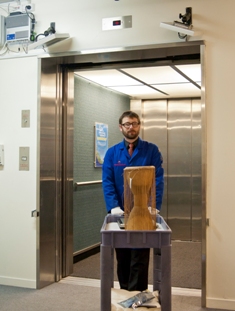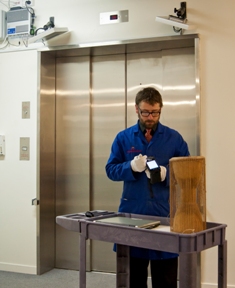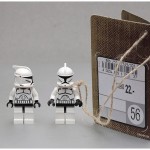The Otago Museum is leading the way in widely adopting Radio Frequency Identification (RFID) tagging, a system that will eventually see every collection item tracked within Vernon Collection.
The RFID process involves attaching a RFID tag (which contains a microchip with a unique ID encoded to its memory and a small antenna) to a collection item which can then be detected as the item travels past readers, or with a mobile device. This technology has only recently been adapted for museum use, and is set to be major time-saver by significantly streamlining collection management processes.  As the first museum in Australasia to widely implement RFID for collection management, the Otago Museum will become a reference site for others exploring the system’s potential.
As the first museum in Australasia to widely implement RFID for collection management, the Otago Museum will become a reference site for others exploring the system’s potential.
Fixed readers at various exit points in the Museum’s collection storage areas and front of house will track collection item movement through the building, dynamically updating the location field in Vernon as well as tracking related information. The system also sends alerts as required so that key staff are aware of collection item movements.
Implementing the RFID system will form part of a large scale Collection Audit being undertaken by the Museum from 2012. This multi-year project will see the Museum’s collection items individually checked, photographed, RFID tagged and re-housed where necessary, with information held in Vernon reviewed and updated as part of the process.
Once a collection item has been tagged it can much more easily be located in the future through the use of a mobile reader. This will speed up collection access. The Museum’s ability to audit storerooms will be vastly improved as well and will be possible without needing to handle the items, thus reducing risk.
The Museum has worked closely with SmartTrack RFID, a Sydney based company, to devise an appropriate solution for their site, taking into consideration the wide breadth of Otago’s collection and the layout of stores. SmartTrack and the Vernon Systems team have collaborated to be able to provide a result which fully integrates into Vernon CMS – thereby helping to maximise the value of the technology. Physical installation and testing took place in late October, with the system now ‘live’.
The Museum will commence their audit with a pilot project from February – June 2012within the humanities collection. Having thoroughly tested both their audit strategy and the RFID tagging system, they will then move on to working concurrently through the humanities and natural science collections. No doubt they will come across many challenges along the way which will be worked through with the SmartTrack and Vernon teams.
“It made good sense to us to invest in RFID technology as part of our collection management practices”, says Clare Wilson, Director – Collections and Research. “Not only is it valuable right now as we look to get started on a major audit project, but once each storeroom and gallery is audited and items are tagged, we will be in a much better position to facilitate access to the collection and to regularly audit our holdings. With the RFID technology the time required for these functions will be substantially reduced.”

[…]This has been one of the most popular articles on the Vernon Systems website. We interviewed Scott Reeves from Otago Museum again in 2015 to hear about progress on this project.[…]